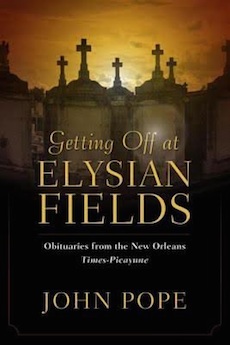By D.T. Siebert
John Pope remarks that typical obituaries too often read like a resume—fact-filled memorials telling us little that made the deceased an individual, not just a vital statistic. Pope’s very readable collection features another kind of obit. A line from the Tennessee Williams play A Streetcar Named Desire serves appropriately both as the book’s title and epigraph: “They told me to take a streetcar named Desire, and then transfer to one called Cemeteries and ride six blocks and get off at—Elysian Fields!”—the paradise of the blessed in Greek mythology.
As humans we must deal with mortality, inventing many ways of coming to terms with it. (My book, Mortality’s Muse: The Fine Art of Dying, treats this subject.) Among these artful ways, perhaps humble but also important, is the newspaper obituary. The many final tributes that John Pope pays to the deceased are telling examples of that sort of human response to mortality.
There is a sense of celebration as well as of grief in these obituaries. In a city like New Orleans—known for its music, its restaurants, its watering holes, and its festive, life-affirming traditions—Pope’s obituaries memorialize these aspects of the city. To be sure, the book is filled with memorials of all sorts of people, white and black, men and women, the famous and the relatively obscure.
Among the obituaries of people associated with food and drink, quite striking is that of Jimmy Brennan, whose family name adorns one of the most famous of New Orleans restaurants. Brennan was a connoisseur of great wine, and at the time of Hurricane Katrina he managed the restaurant’s prize-winning cellar, then containing some 35,000 bottles. A long power failure doomed the cellar, including a bottle of 1870 Lafite Rothschild worth some $60,000. As Pope says, “Before all the cellar’s contents could go bad, Mr. Brennan embarked on what he called ‘the grand tasting’ with Lazone Randolph, the chef, and a handful of people who had stayed in the restaurant to protect it from vandalism and looting.” Some years later, after Jimmy Brennan’s death, Pope quotes Brennan’s brother, “We toasted him with a bottle of Dom Perignon 1990, his favorite champagne, and wished him bon voyage.”
Among other colorful characters celebrated in this collection, another one stands out for food considerably less haute cuisine than Brennan’s. This is the obituary of Al Copeland, who made a fortune (and briefly lost it) in the fried-chicken franchise business (the Popeyes chain). Married a number of times, fond of ostentatious sports cars, racing boats, and lavish Christmas displays at his house, Copeland died from complications of cancer treatment at the age of 64. Pope includes a write-up of Copeland’s funeral in a city where funerals qualify as a festive art form.
Copeland’s certainly measured up. His horse-drawn hearse, accompanied by his expensive automobiles and by jazz bands, which played traditional songs such as “St. James Infirmary,” were all part of the extravaganza. The officiating priest at the funeral mass joked that Copeland had gone to the top to see the Pope before his death, but Pope Benedict was away. Just as well, he said, because “Al didn’t speak Italian and German, and the pope didn’t speak no yat.” John Pope adds, “At New Orleans funerals, jazz bands end with something upbeat. This time, the selection was the commercial jingle “Love That Chicken From Popeyes.”
D.T. Siebert (ΦBK, University of Oklahoma, 1962) is Distinguished Professor Emeritus of English Literature at the University of South Carolina, Columbia. His recent book Mortality’s Muse: The Fine Art of Dying (Delaware, 2013) was reviewed in The Key Reporter in 2014.




